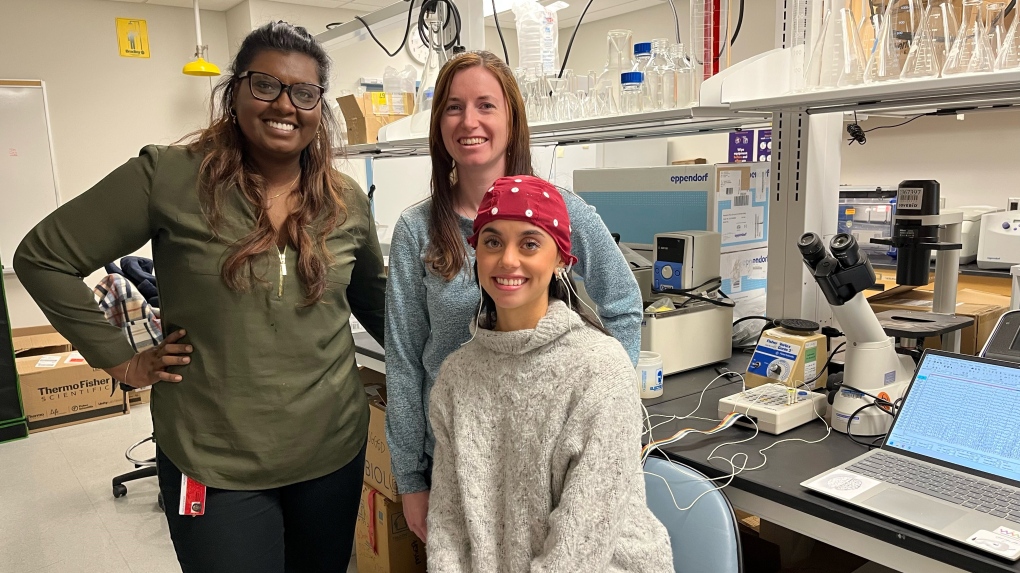Wilfrid Laurier researcher studying the role of light in early cancer detection
A researcher at Wilfrid Laurier University has been awarded $100,000 to advance her study into the correlation between cancerous tissues and light.
Nirosha Murugan was one of ten researchers from around the world who was awarded the money from the 2023 Optica Foundation Challenge.
The goal of Murugan’s research is to eventually create an imaging platform that could detect cancer earlier, and to identify cognitive impairments from chemotherapy earlier.
“The very first finding I found in my graduate degree is that cells are very receptive to external light, magnetic fields and electricity,” Murugan said.
“It kind of moved toward cancer, and we noticed that cancer cells are highly receptive to these kinds of signals – more than healthier tissue – and we can actually use them as new therapeutics.”
The project could lead to a non-invasive detection platform.
“With light being able to penetrate and be emitted from tissue, we could have sensors outside of the body that can tell us what’s happening inside non-invasively,” Murugan said.
Another part of the research project looks at the cognitive affect chemotherapy has on some patients, known as “chemo brain.”
“Unfortunately, even though chemotherapy is a lifesaving drug, it actually has a lot of impact on brain health and it can cause cognitive decline,” Murugan said.
“There’s not a lot of understanding as to why some people are affected cognitively by chemotherapy and some people are not. With exploring how the brain changes in a very early way with these light signals, we might be able to get a good understanding.”
 From left: Nirosha Murugan, Victoria Hossack and another member of the reasearch team in the lab. (Stefanie Davis/CTV Kitchener)
From left: Nirosha Murugan, Victoria Hossack and another member of the reasearch team in the lab. (Stefanie Davis/CTV Kitchener)
From there, the researchers hope to find strategies to catch “chemo brain” earlier.
Victoria Hossack, a post-doctoral fellow working in Murugan’s lab, explained that they look for changes in brain signals that occur before the onset symptoms.
“In the context of this study, we want to see who’s going to develop the cognitive changes of chemotherapy before it starts happening so we can have an earlier intervention,” she said.
In addition to being invasive, current cancer diagnostics can be expensive.
“My dream is that this is accessible to everyone, regardless of where they’re from,” she said.
Hossack said projects like this are the reason she committed to her line of study.
“I can use the knowledge and the skills that I developed in my graduate studies and now apply them to research that will have a huge impact on a lot of people,” she said.
Murugan said the Optica funding will help the team leverage their technology for about a year, but she hopes to find funding after that.
“Optica as a foundation has really opened up a lot of my doors in understanding how the physical world blends with the biological world. This grant allows us to explore that a lot more deeply and with technology that we otherwise wouldn’t have been able to get,” Murugan explained.
“It gives us the room to explore light-based biomarkers, specifically for biology.”
CTVNews.ca Top Stories

Trudeau's 2024: Did the PM become less popular this year?
Justin Trudeau’s numbers have been relatively steady this calendar year, but they've also been at their worst, according to tracking data from CTV News pollster Nik Nanos.
Manhunt underway after woman, 23, allegedly kidnapped, found alive in river
A woman in her 20s who was possibly abducted by her ex is in hospital after the car she was in plunged into the Richelieu River.
Death toll in attack on Christmas market in Germany rises to 5 and more than 200 injured
Germans on Saturday mourned both the victims and their shaken sense of security after a Saudi doctor intentionally drove into a Christmas market teeming with holiday shoppers, killing at least five people, including a small child, and wounding at least 200 others.
Overheated immigration system needed 'discipline' infusion: minister
An 'overheated' immigration system that admitted record numbers of newcomers to the country has harmed Canada's decades-old consensus on the benefits of immigration, Immigration Minister Marc Miller said, as he reflected on the changes in his department in a year-end interview.
Wild boar hybrid identified near Fort Macleod, Alta.
Acting on information, an investigation by the Municipal District of Willow Creek's Agricultural Services Board (ASB) found a small population of wild boar hybrids being farmed near Fort Macleod.
Summer McIntosh makes guest appearance in 'The Nutcracker'
Summer McIntosh made a splash during her guest appearance in The National Ballet of Canada’s production of 'The Nutcracker.'
The winter solstice is here, the Northern Hemisphere's darkest day
The winter solstice is Saturday, bringing the shortest day and longest night of the year to the Northern Hemisphere — ideal conditions for holiday lights and warm blankets.
22 people die in a crash between a passenger bus and a truck in Brazil
A crash between a passenger bus and a truck early Saturday killed 22 people on a highway in Minas Gerais, a state in southeastern Brazil, officials said.
Back on air: John Vennavally-Rao on reclaiming his career while living with cancer
'In February, there was a time when I thought my career as a TV reporter was over,' CTV News reporter and anchor John Vennavally-Rao writes.
































